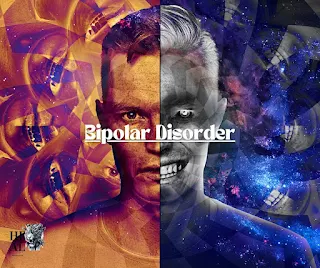Bipolar disorder
Bipolar disorder, formerly known as manic-depressive illness, is a mental health condition characterized by extreme mood swings that include emotional highs (mania or hypomania) and lows (depression). These mood swings can affect sleep, energy levels, judgment, behavior, and the ability to think clearly.
Symptoms of Bipolar Disorder
Manic Phase:
- Elevated Mood: Feeling overly joyful or elated.
- Increased Energy: Heightened activity levels; feeling jumpy or wired.
- Racing Thoughts: Quickly moving from one idea to another.
- Impulsive Behavior: Engaging in risky behaviors like excessive spending, reckless driving, or sexual indiscretions.
- Decreased Need for Sleep: Feeling rested after only a few hours of sleep.
Depressive Phase:
- Sadness: Feeling hopeless, empty, or tearful.
- Loss of Interest: Losing interest in activities once enjoyed.
- Fatigue: Low energy levels and sluggishness.
- Sleep Problems: Insomnia or excessive sleeping.
- Difficulty Concentrating: Trouble making decisions or remembering things.
- Thoughts of Death or Suicide: Persistent thoughts of death, suicide, or suicide attempts.
Manic Phase:
- Elevated Mood: Feeling overly joyful or elated.
- Increased Energy: Heightened activity levels; feeling jumpy or wired.
- Racing Thoughts: Quickly moving from one idea to another.
- Impulsive Behavior: Engaging in risky behaviors like excessive spending, reckless driving, or sexual indiscretions.
- Decreased Need for Sleep: Feeling rested after only a few hours of sleep.
Depressive Phase:
- Sadness: Feeling hopeless, empty, or tearful.
- Loss of Interest: Losing interest in activities once enjoyed.
- Fatigue: Low energy levels and sluggishness.
- Sleep Problems: Insomnia or excessive sleeping.
- Difficulty Concentrating: Trouble making decisions or remembering things.
- Thoughts of Death or Suicide: Persistent thoughts of death, suicide, or suicide attempts.
Causes and Triggers
While the exact cause of bipolar disorder is not known, several factors may contribute to its development:
- Genetic Factors: Bipolar disorder tends to run in families, suggesting a genetic link.
- Biological Differences: People with bipolar disorder may have physical changes in their brains.
- Neurotransmitter Imbalance: Imbalance in neurotransmitters like serotonin and dopamine can contribute to mood disorders.
- Environmental Factors: Stress, abuse, significant life changes, and other environmental factors may trigger or worsen bipolar symptoms.
Treatment Options
Effective treatment for bipolar disorder usually involves a combination of medication, therapy, and lifestyle changes:
Medications:
- Mood Stabilizers: Help control manic or hypomanic episodes.
- Antidepressants: Used cautiously to manage depressive episodes.
- Antipsychotic Medications: Sometimes used to manage symptoms of mania or psychosis.
Therapy:
- Cognitive Behavioral Therapy (CBT): Helps identify and change negative thought patterns and behaviors.
- Psychoeducation: Provides information about the disorder and teaches coping strategies.
Lifestyle Changes:
- Routine: Maintaining a regular schedule for sleep and activities.
- Support Network: Building a strong support system of friends, family, and mental health professionals.
- Avoiding Triggers: Minimizing stress and identifying triggers that may worsen symptoms.
Living with Bipolar Disorder
Managing bipolar disorder is a lifelong process that requires ongoing treatment and support. With proper treatment, many people with bipolar disorder can live fulfilling lives and maintain stable relationships and careers.
Conclusion
Bipolar disorder is a complex mental health condition that affects millions worldwide. By understanding its symptoms, causes, and treatment options, individuals can seek appropriate help and manage their condition effectively. If you or someone you know is struggling with bipolar disorder, seeking professional help is crucial for a proper diagnosis and personalized treatment plan.
For more information on bipolar disorder, visit reputable sources such as the National Institute of Mental Health or consult with a mental health professional.
This article aims to provide a comprehensive overview of bipolar disorder, promoting awareness and understanding in a humanized manner.
Sources:
- National Institute of Mental Health
- Mayo Clinic
- American Psychiatric Association

